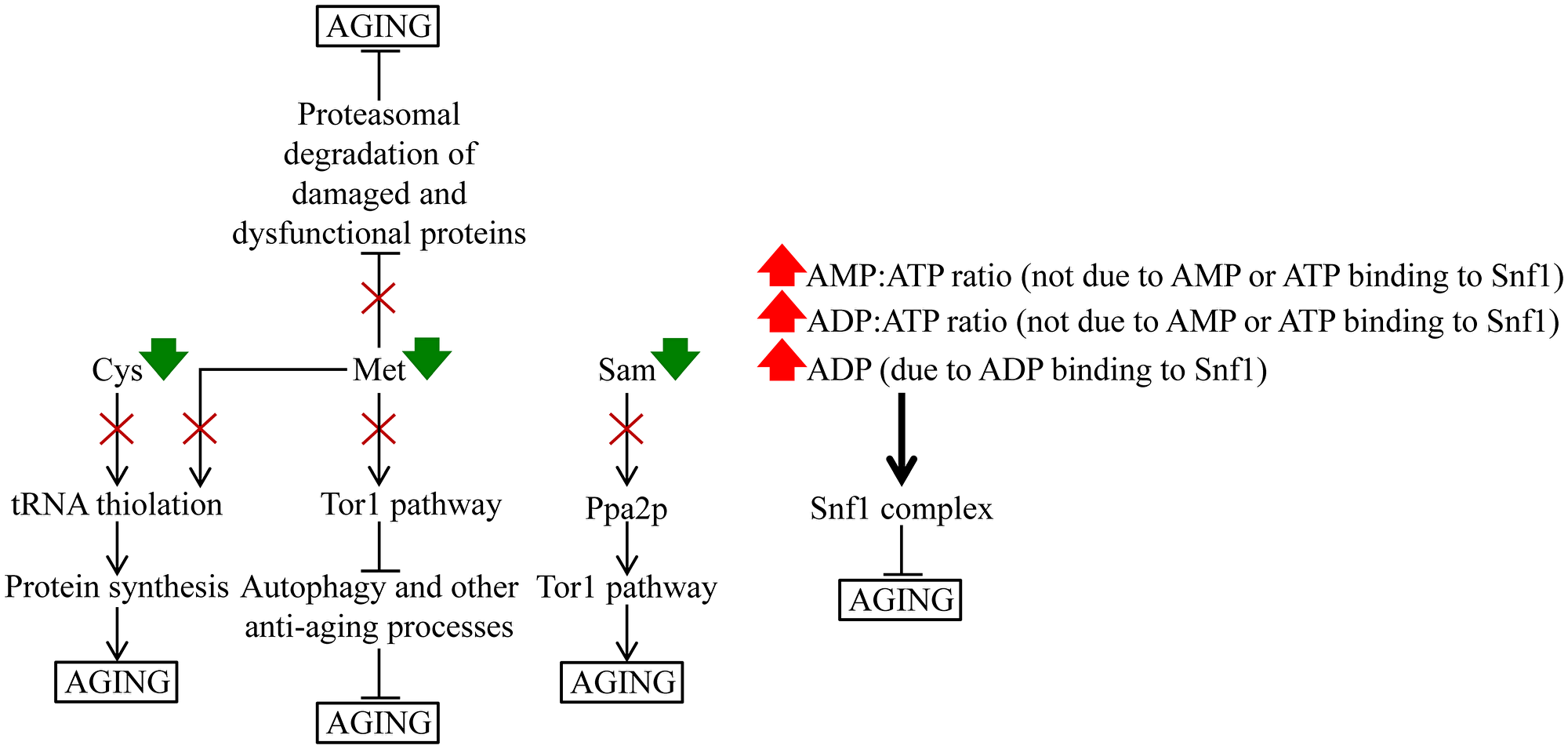The cover for issue 7 of Oncotarget features Figure 14, "A hypothetical model of how a specific remodeling of cellular metabolism by CR slows down yeast chronological aging," published in "Caloric restriction creates a metabolic pattern of chronological aging delay that in budding yeast differs from the metabolic design established by two other geroprotectors" by Mohammad, et al. which reported that caloric restriction and the tor1Δ mutation are robust geroprotectors in yeast and other eukaryotes.
The authors demonstrate that caloric restriction generates a unique metabolic pattern.
Unlike the tor1Δ mutation or lithocholic acid, it slows down the metabolic pathway for sulfur amino acid biosynthesis from aspartate, sulfate and 5-methyltetrahydrofolate.
Consequently, caloric restriction significantly lowers the intracellular concentrations of methionine, S-adenosylmethionine and cysteine.
They also noticed that the low-calorie diet, but not the tor1Δ mutation or lithocholic acid, decreases intracellular ATP, increases the ADP:ATP and AMP:ATP ratios, and rises intracellular ADP during chronological aging. The Oncotarget authors propose a model of how the specific remodeling of cellular metabolism by caloric restriction contributes to yeast chronological aging delay.
The Oncotarget authors propose a model of how the specific remodeling of cellular metabolism by caloric restriction contributes to yeast chronological aging delay.
Dr. Vladimir I. Titorenko from Concordia University said, "A body of evidence indicates that metabolism is an essential contributor to the aging and longevity of eukaryotic organisms across phyla."
Indeed, healthy aging of the evolutionarily distant eukaryotes coincides with age-related changes in the concentrations of specific metabolites within cells, tissues, organs and biological fluids.
Furthermore, such dietary interventions as caloric restriction, reduced protein intake, a limited supply of single amino acid and alternating cycles of feeding and fasting are robust geroprotectors that specifically rewire cellular and organismal metabolism in various eukaryotic organisms.

Figure 14: A hypothetical model of how a specific remodeling of cellular metabolism by CR slows down yeast chronological aging. See the text for more details. Abbreviations: Cys, cysteine; Met, methionine; Ppa2p, inorganic pyrophosphatase 2; Sam, S-adenosylmethionine; Snf1, sucrose non-fermenting complex 1; Tor1, target of rapamycin complex 1.
Moreover, allelic variants of the genes implicated in diverse metabolic pathways delay aging and extend longevity in eukaryotic organisms across species.
Besides, pharmacological interventions that target distinct aspects of metabolism are potent geroprotectors in diverse eukaryotes; these interventions include metformin, rapamycin, resveratrol, spermidine and others.
It remains unclear if different dietary, genetic and pharmacological anti-aging interventions set up a similar metabolic pattern of aging delay or each of them generates a distinct metabolic profile.
The Titorenko Research Team concluded in their Oncotarget Research Output that:
1. What is the mechanism responsible for ATP decline under CR conditions? They hypothesize that CR might affect the transcription and/or translation of enzymes involved in ATP synthesis and/or degradation in the cytosol, mitochondria or other cellular locations.
Of note, a transcription/translation-based mechanism of suppressing methionine biosynthetic enzymes and transporters underlies the ability of CR to lower intracellular methionine and extend yeast RLS.
2. What are the metabolic changes underlying the extremely efficient longevity extension in yeast culture under CR conditions with LCA? Their findings indicate that LCA applied under CR conditions “overrides” the CR-specific metabolic profile of aging delay.
Sign up for free Altmetric alerts about this article
DOI - https://doi.org/10.18632/oncotarget.27926
Full text - https://www.oncotarget.com/article/27926/text/
Correspondence to - Vladimir I. Titorenko - [email protected]
Keywords - cellular aging, geroprotectors, caloric restriction, metabolism, methionine
About Oncotarget
Oncotarget is a bi-weekly, peer-reviewed, open access biomedical journal covering research on all aspects of oncology.
To learn more about Oncotarget, please visit https://www.oncotarget.com or connect with:
SoundCloud - https://soundcloud.com/oncotarget
Facebook - https://www.facebook.com/Oncotarget/
Twitter - https://twitter.com/oncotarget
LinkedIn - https://www.linkedin.com/company/oncotarget
Pinterest - https://www.pinterest.com/oncotarget/
Reddit - https://www.reddit.com/user/Oncotarget/
Oncotarget is published by Impact Journals, LLC please visit https://www.ImpactJournals.com or connect with @ImpactJrnls
Media Contact
[email protected]
18009220957x105





